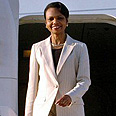
Rice: Policy toward Hamas won't change
U.S. Secretary of State cautions Palestinian voters ahead of upcoming elections, implying Bush administration won't work with Palestinian government dominated by terror group; British PM says it would be difficult for West to negotiate with Hamas unless group renounces terrorism
U.S. Secretary of State Condoleezza Rice on Monday cautioned Palestinian voters, who will choose a parliament this week, that terrorism is not a pathway to peace.
With the Hamas party running neck-and-neck with Palestinian leader Mahmoud Abbas' Fatah party before Wednesday's balloting, Rice said it does not work to have "one foot in terrorism and the other foot in politics."
"The United States won't change its policies toward Hamas," Rice said, implying the Bush administration would not work with a Palestinian government dominated by that party.
Referring to potential peace talks between the Palestinians and Israel, she said that "it's hard to have negotiations with a party that you do not recognize its right to exist."
Hamas is listed as a terrorist organization by the State Department. The radical group has taken responsibility for many attacks on Israel.
The Fatah movement, once headed by the late Yasser Arafat and now by Palestinian leader Mahmoud Abbas, is competing with Hamas for a majority of the 132 seats in a Palestinian parliament.
Neither Rice nor State Department spokesman Sean McCormack explicitly ruled out dealing with a Palestinian government in which Hamas played a significant role.
Blair: Organization will not get anywhere with path of violence
Rice said since Hamas had not renounced violence and was a terrorist group, that would be "a very practical problem."
"If we indeed do want a path to peace between Israel and the Palestinian people it is going to have to be one in which Palestinians and any Palestinian government are committed to a peaceful path," Rice said.
British Prime Minister Tony Blair also referred Monday to the possibility of Hamas joining a Palestinian government, saying it would be difficult for the West to negotiate with Hamas unless the group renounced terrorism.
"It is very difficult for us to be in the position of negotiating or talking to Hamas unless there's a very clear renunciation of terrorism," Blair told a monthly news conference.
He said he would wait to see what happened in the parliamentary elections on Wednesday in which Hamas could make a strong enough showing to join the Palestinian government.
"It is very difficult ... We don't know what the election results will be," Blair said.
"But in the end all organizations have to choose whether they want a path of violence or a path of politics and there's no way they will get anywhere with a path of violence," he said, declining to be pressed further on the issue.
Referring to the Iranian issue, Rice said Monday that "the time has come" to send Iran before the U.N. Security Council over its disputed nuclear program, but she seemed to acknowledge that U.N. action may not be swift.
Iran warned that it would intensify its nuclear development if referred to the Security Council.
'Time has come for referring Iran to U.N.'
"It has been our belief, and it is that of the Europeans as well and a number of other states, that the time has come for referral" to the United Nations body, Rice said following a meeting with Italian Foreign Minister Gianfranco Fini.
Calling the case for referral "very strong," Rice said the United States will push for it at a special meeting of the U.N. nuclear watchdog agency early next month.
She would not speculate on what action the Security Council might take, or comment on whether the United States would be satisfied with an outcome less punitive than international economic sanctions.
"The Security Council can then take up the matter at a later time, but the referral absolutely has to be made," Rice said.
Although Rice stressed the strength of international resolve to stop Iran's march toward possible nuclear weapons, she was reminded that even strong military allies may not share the United States' preference for harsh repercussions for Tehran.
Fini said he agrees that Iran's case should go to the Security Council, which could take a range of steps up to broad trade sanctions or an oil embargo. But Fini began remarks on Iran by noting that Italy is Iran's largest European trading partner, a reminder that economic measures against the oil exporter would have consequences far beyond Iran.
"The Security Council will evaluate the issue, we hope, with flexibility and with political farsightedness," Fini said.
Reuters contributed to the report










